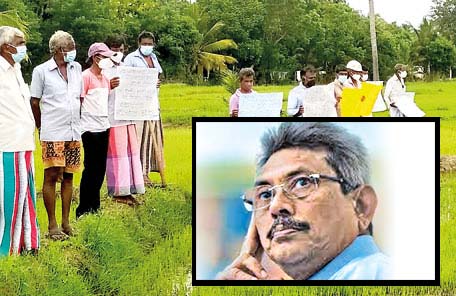Last week’s relaxing of the ban on importing synthetic fertilizer will allow it to be brought into the country for specific types of cultivation. It will also pave the way for the import of organic nitrogen extracts to boost the nutrition level in organic fertilizer that is produced in Sri Lanka.
The government’s latest move is raising questions in the agriculture industry whether it’s an admission of the impracticality of an overnight transition to organic farming. ‘No one in the world would imagine jacking up the nitrogen content in organic fertilizer’, said a sectoral specialist. ‘The government’s advisors have pushed it to this end after realizing there is no other way, even theoretically, to provide nutrients to plants.’
In a volte face the government said it will issue licenses to import nitrogen minerals, synthetic fertilizer and chelated minerals and nutrients for protected agriculture in green houses and for hydrophonics, aerophonics and floriculture. It was not long ago on 6 May that it issued a gazette notice completely banning the import of synthetic fertilizer although this has not been tabled in parliament yet. It raises questions about the legitimacy of the ban.
The government justified the sudden import ban, which perplexed the agriculture industry, as a step towards keeping its promise to the nation. One of President Gotabaya Rajapakse’s pre- election pledges in his Vistas of Prosperity and Splendour manifesto was that the country will convert to organic farming during ten years. Most industry experts are sceptical about the motives behind the move and are convinced it was not taken for the love of the nation or the health of its people, but rather because of a lack of dollars and cents. According to the United Nations COMTRADE database on international trade, Sri Lanka paid $ 260.3 million to import fertilizer last year. According to guesstimates nitrogen extracts could cost the government about $ 51 million. This will be only for paddy cultivation in the coming Maha season.
In addition to the import of organic nitrogen extracts, what will also be allowed are mineral potassium, compound fertilizer with the three plant nutrients, namely mineral or chemical nitrogen, phosphorous and potassium or capsules with a mix of two of them or packets weighing 10kg or less containing such products. The new licensing system will be valid for six months.
According to Professor Buddhi Marambe, a crop scientist in the Agriculture Faculty at the University of Peradeniya, the nitrogen extract can be added either directly to organic fertilizer or made into a solution before it can be sprayed on it. It can also be added direct to the plant as a solution.
Nitrogen, together with phosphate and potassium, is a key nutrient for robust plant growth. All together, a plant needs about 18-19 nutrients. The familiar sight of yellowing leaves come about when the plant is suffocated of nitrogen. As essential as it is for a plant’s growth, nitrogen is also notoriously difficult to manage because of the way the plant absorbs it. ‘The application of fertilizer is a science’, points out professor Marambe. It has to be done in right quantities at the right stages of the plant’s growth. It can’t be arbitrary. It’s like nurturing a child’.
In synthetic fertilizer, which releases nitrogen rapidly, the main source of nitrogen is the urea which is added to it. Nitrogen is a ‘production intensive’ nutrient, requiring about 100kg of urea for a nitrogen volume of 46 percent. In the case of organic fertilizer which is made of plant and animal matter the nitrogen component is usually generated by muck such as cow dung and the volume, at around 1- 3. 5 percent, is low. The release of nitrogen in organic fertilizer is also slow.
One of the biggest challenges of using organic fertilizer is generating the required volumes of nitrogen based on the requirement of the plant at various growth stages. The difficulty is compounded when these high volumes have to be generated almost overnight with no training and preparation for it. While the nitrogen extracts that can now be imported will fulfill this requirement in the interim, whether it can satisfy the required quantities of nitrogen and at what cost is debatable. Nitrogen extracts can increase the nitrogen in fertilizer up to about three to five percent at most and a comparison with the volume of nitrogen in synthetic fertilizer gives a clear idea of the quantities that will be needed.
‘The government is shadow boxing’, said an industry insider alluding to the hazy and circuitous route it appears to be taking to extricate itself from a hole that it has dug for itself. While the import of nitrogen supplements will be a small measure of relief for an industry which is struggling from the knock-on effect of the ban which has left fertilizer shortages in its wake, it will be a face saver for the government which is trying to live down the ignominy of having to reverse another gazette notification.
Meanwhile earlier this week the cabinet approved the appointment of a committee to provide policy guidance for the transition from synthetic to organic farming. The committee will be headed by Priyantha Indralal Yapa, Professor of Environmental Agriculture in the University of Sabaragamuwa.
In May this year the president appointed a 46- member taskforce comprising members of parliament, plantation sector personnel and businessmen to prepare a roadmap for the transition. A reliable source said the taskforce has met only once so far.





